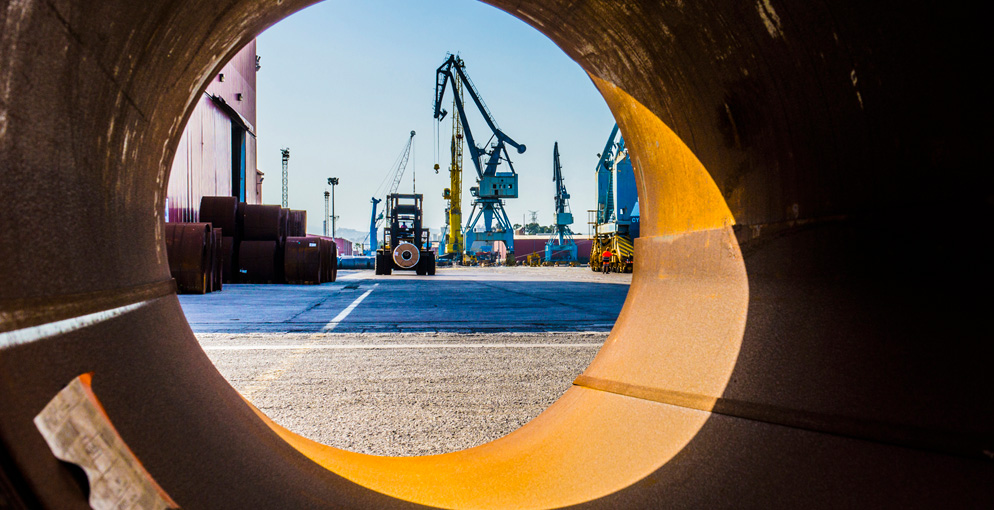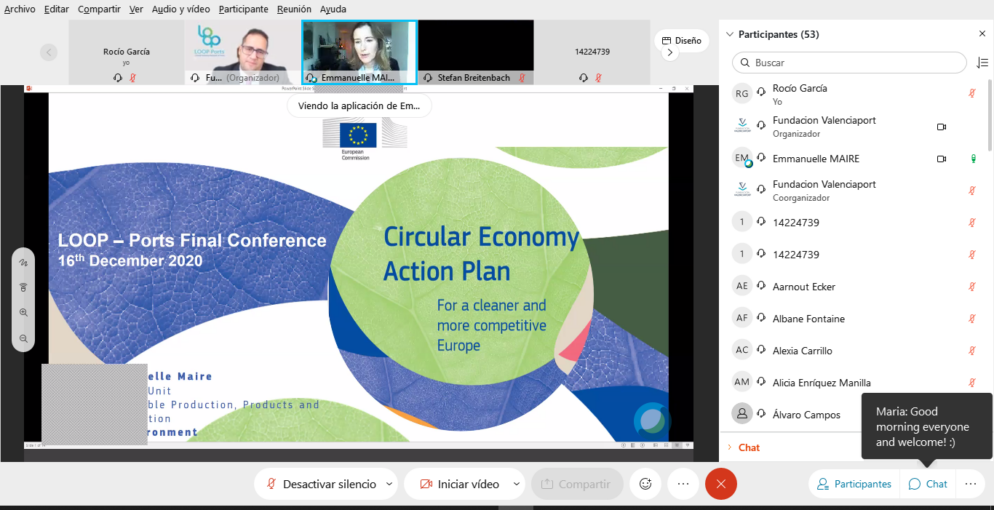Circular economy as the best short-term solution to boost the sustainability of European ports

LOOP-Ports circular economy project, coordinated by Fundación Valenciaport and co-financed by Climate KIC, has held its final conference in which the partners presented the main results of this initiative to an audience of more than 75 people.
The conference as an official event of the World Circular Economy Forum Online, was opened by Emmanuelle Maire, Head of Unit of Sustainable Production, Products and Consumption of DG Environment of the European Commission, who explained the new Circular Economy Action Plan for Europe. Next, the Technical Director of the IAPH (International Association of Ports and Harbors), Antonis Michail, presented the World Port Sustainability Programme initiative (WPSP). The opening session was completed with the interventions of Rocío García, member of the Innovation team of Fundación Valenciaport, who presented the objectives and general scopes of the LOOP-Ports project, and María Loloni, Maritime Programme Manager of Climate KIC, who presented other projects developed in the framework of this programme for maritime sector.
This was followed by two panels presenting the results of the project, led by the leaders of the different activities. The first panel began with the presentation of the methodology used to classify more than 450 European ports analysed during the project, followed by a revision of some of the circular economy initiatives characterised by their high degree of replicability in other ports. These activities are the use of dredging material to produce cement; the use of biodegradable fishing nets or the valorisation of fish by-products for the creation of cosmetics, animal feed and nutraceutical products. The first panel concluded with the presentation of a set of innovation recommendations for the European port sector obtained thanks to the deep analysis done of 25 interviews with entities like port managers, logistics associations and public bodies. Those entities were consulted on the levers of change that could accelerate the transition of European ports towards a more circular economy. Some of the recommendations put forward were among others, the co-creation of solutions by collaborative thinking between port stakeholders clusters; the identification of best technological and process practices from other sectors applicable in the port; the support to ports to find feasible and reliable financing mechanisms; the integral evaluation and development of specific policies and regulations for the port sector in this matter; the adoption of business models sustainable over time supported by fiscal instruments and ad-hoc training solutions for professionals of the sector.

During the second panel, the training pilots in circular economy developed and implemented in Denmark, Italy and Spain that serve to train 50 port and detailed information about the 15 local, institutional and European workshops with the participation of more than 550 maritime port sector people was presented. In addition, the coordinator of LOOP-Ports, Jorge Lara, presented the seven business models studied during the project, paying special attention to their value proposition and their possible replicability and feasibility in other EU ports. These business models deal with different topics such as industrial symbiosis applied to port industries; energy supply to ships; recycling of different waste flows through pyrolysis; use of hydrogen from renewable energies in ports; recycling of sea containers for alternative uses; recovery of fibreglass from recreational boats and heat recovery from refrigerated warehouses in ports that move perishable goods.
Finally, Jorge Lara closed the conference by emphasising once again the three main objectives on which the circular economy in ports should be focused: the first is to become aware of this problem and the wideness of the concept; the second is to be able to offer tailored training for port workers and the third is to have real business models that can be replicated and sustainable over time to achieve a more circular approach at ports.
LOOP-Ports project
The LOOP-Ports project (Circular Economy Network of Ports), co-financed by Climate KIC and coordinated by Fundación Valenciaport, has as its main objective to facilitate the transition towards a more circular economy in the port sector, where products, materials and resources are not considered as waste, but can become sustainable and replicable business models in ports of similar characteristics. The project was awarded at the International Association of Ports and Harbors (IAPH) World Port Sustainability Awards 2020 – in the “Climate and Energy” category.
Thirteen partners from six EU member states (Spain, Italy, France, Germany, Denmark and the Netherlands) are participating in Loop-Ports: Fundación Valenciaport (coordinator); Climate KIC S.L.; Climate-KIC S.r.l. Climate-KIC GmbH; Danmarks Tekniske Universitet (DTU); NTU International A/S; Nederlandse Organisatie voor Toegepast Natuurwetenschappelijk Onderzoek (TNO); Università di Bologna; Universität Hamburg; Universidad Politécnica de Madrid; Universitat de València; Eco Environnement Ingenièrie (2EI) and Veolia Innove.
